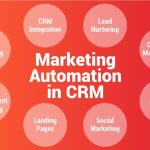“The first rule of any technology used in a business is that automation applied to an efficient operation will magnify the efficiency. The second is that, the automation applied to an inefficient operation will magnify inefficiency.”
− Bill Gates
Automation is essential in CRM considering the requirement of handling a huge size of customer base and the level of complexity in each sales force related or marketing related tasks. CRM makes use of three types of automation: Sales Force Automation (SFA), Marketing Automation (MA), and Services Automation (SA). In this chapter, we will learn about Sales Force Automation.
CRM needs to be accessed by various people in the business. It is most frequently accessed and used by salespersons and managers of the sales activities at various ranks of seniority. SalesForce is a software that works as a supporting system for the salespersons and managers to achieve their work related objectives. SFA technology helps a business to collect, store, modify, analyze, and transport the sales related data. SFA is the strategy used to drive efficiencies in your sales processes.
SFA software is used by various salespersons such as salespersons in B2B and B2C contexts, door-to-door salesmen, direct sellers, online sellers, etc. It is used by managers to track customers, manage sales pipelines, customize the offers, and generate reports, to name a few.
SFA Solution Providers
Some SFA providers are specialists focus on a particular functionality of SFA. They compete against enterprise solution providers (who provide a complete range of business solutions such as Supply Chain Management (SCM), Enterprise Resource Planning (ERP), and CRMs) and also some providers of CRM suites that include SFA modules. Some renowned SFA specialists are as given below −
| SFA Specialist | SFA as Part of CRM Suite | SFA as Part of Enterprise Suite |
| Cyberform | Microsoft Dynamics | IBM |
| Salesnet | Salesforce.com | Oracle |
| Selectica | SalesLogix | SAP |
The CRM solution providers also come up with configurators, the software engines that allows the customers to customize their products. Since the configurators help to build customized products, the stress on the salespersons of handling complex data without errors is reduced. In turn, their training cost is also reduced.
For example, Dell computers allows its customers to interact with the configurator. The customers can select devices of their own choice and specifications, and build their own computers.
SFA Hardware and Infrastructure
In the era of growing businesses, the SFA hardware and infrastructure must be able to cope up with large number of customers for long time.
In house salespersons are comfortable using desktop or laptop computers but the outdoor salespersons of a business prefer palmtops, tablets, phablets, or simply, the smartphones. In such wide range of devices, the SFA technology should be capable of executing on each type of device.

In case of global business, the salespersons and managers across all the outlets need to access the CRM database a large number of times. In such situation, the SFA technology should be equipped with handling distant communication or data transfer over wireless and speedy media.
SFA Allied Services
The services generally take 50 to 60% portion of the total automation project costs. For example, data services such as data security.
The SFA project managers sometimes buy services from the service providers. The service providers contribute in business profits and the cost of the entire CRM projects. These services need re-engineering or tuning few selling processes according to the business requirements.
Functionalities of SFA Software
An SFA software can provide the following functionalities −
● Account management − Under this, the salespersons and managers get a complete overview of customer relationship. It includes customer’s personal details, contact, past contacts, past orders delivered, current orders, transactions, etc.
● Contact management − It refers customers’ contact numbers, Email ID, address, contact preferences, etc., for maintaining contacts by creation, updating, tracking appointments and contacts, etc.
● Contract management − It helps users to manage contracts with the customers by offering the functions of tracking, monitoring, progressing, and terminating the contracts.
● Document management − It helps the users maintain product lists, brochures, product specification manuals, price lists, and quotation templates.
● Event management − It enables to plan the events such as conference, trade show, webinars, seminars, meetings, etc. with customers or other partners. It features event calendar, event reports, etc.
● Incentives management − The sales managers use this function to appraise and reward the salesperson’s efforts. It can be linked to payroll application for automatic payment.
● Lead management − It enables the business to create, assign leads to various salespersons for equal task distribution, and track sales leads.
● Opportunities management − It enables users to create opportunity, administer its progress, and estimate users’ bonus.
● Order management − Once the customers agree to purchase a product, this facility turns quotation into accurately priced orders. It is composed of price lists and product configurator.
● Pipeline management − It helps to maintain entire sales cycle right from identification of prospects to order delivery and closure.
● Product Encyclopedia − It is an electronic encyclopedia of products with their names, model numbers, picture, and specifications. It is made accessible to the customer online.
● Product Configuration − It enables users or customers to design and price the product by selecting the specifications of their choice.
● Product Visualization − It enables the users or customers to create a realistic 3D model of the product. It is created by referring to the technical diagrams.
● Quotation management − It allows the salespersons and managers to create, edit, and deliver customized proposal.
● Sales prediction − It helps the salespersons and managers to forecast sales figures.
Benefits of Sales Force Automation
Vendors, salespersons, and managers claim myriad benefits of implementing and using SFA. Some important benefits are as listed −
● Vendor’s perspective − Improved customer relationship, staff productivity, and business revenue.
● Salesperson’s perspective − More closing opportunities, short sale cycles, ease of tracking sales cycle.
● Manager’s perspective − Increase in salesforce productivity and accurate reporting.
● Business perspective − Improved customer relationships, Increase in sales revenue, improved market share, increase in profitability.
Popular SFAs
Some Popular Salesforce Automation Software Systems are: Salesforce.com, Infusionsoft, Microsoft Dynamics CRM, Prophet CRM, PlanPlus online, Sugar CRM, etc.



Comments are closed